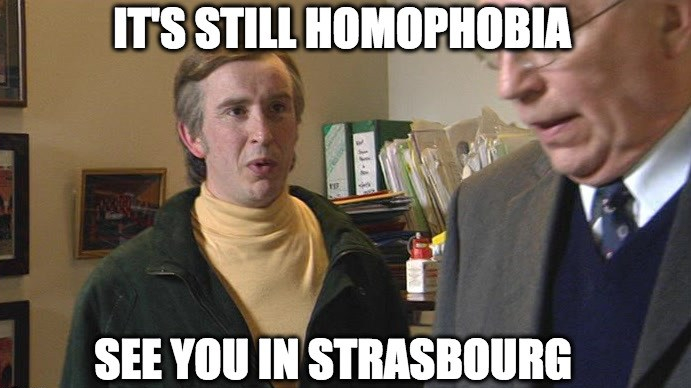Last month, a primary school in Glenarm became the first Catholic school in Northern Ireland to become integrated, prompting great fanfare from secularists. A secular society, argue secularists, is one that is unrivalled in its capacity for tolerance, its high view of science and, crucially, in its neutrality.
Sounds amazing, doesn’t it? What kind of dinosaur wouldn’t place their trust in such a reasonable and progressive system? You would have to be literally Hitler to disagree.
But is it true? Is secularism neutral? And does it have a high view of science and tolerance?

Self-defeating and logically impossible.
Well, not really. The appeal of neutrality is certainly understandable. The idea that no one group should be advantaged over another is a sound one—and should be strived for insofar as possible—but it doesn’t address the need to differentiate between competing ideas of what good is. Issues like euthanasia, abortion, free speech, etc., are all bitterly contested—even amongst secularists—so, who is right and on what grounds?
For a civilised society to function properly, it is important to promote some ideas as beneficial and relegate others as harmful, which necessitates appealing to some sort of higher code. Herein lies the problem for secularism.
Adjudicating between competing conceptions of good requires something other than mere neutrality to be successful—otherwise (and try and follow me on this) neutrality itself would be perceived as the ultimate good and therefore wouldn’t be neutral! It’s self-defeating.
The solution must be anchored to a coherent understanding of what government is and what its responsibilities are, which itself is part of a larger moral project that encompasses everything from what it means to be human to why we ought to behave in certain ways—questions that neutrality is ill-equipped to answer because there is no neutral ground on which to discuss them.
Traditionally, differentiating between competing concepts of good was done via an appeal to a higher moral authority that sits outside human ability to change. In other words, an ontic referent (i.e. God). But, of course, on secularism there is no God or gods (or if there is, he/she/it/they has no business interfering in human affairs), so man and man alone is the measure of all things. The problem with that, of course, is the standards by which man measures things change with frightening rapidity, often without notice. Such a system leaves no room for neutrality.
Therefore, we should see secular neutrality as a logical impossibility; it is completely untenable. If neutrality is seen as the highest good for governance then the State would be compelled to impose it, which would require more state intervention to make sure everything remains neutral. Which is anything but neutral.
Everyone has moral beliefs they want enshrining in law
The second problem with the idea of secular neutrality is that everyone—absolutely everyone—has a set of beliefs and moral assumptions they want to see reflected in law. Secularists, as evidenced by their indefatigable lobbying on issues such as (take a deep breath, this is a long sentence) same-sex marriage, abortion access, blasphemy laws, euthanasia, collective worship in schools, sex education, religious education, integrated education, all the other educations, public religious displays, graphic abortion imagery, gay conversion therapy (but not gender conversion therapy, that’s beautiful and empowering), organ donation, animal rights, etc. etc. etc — are no exception. The phrase “don’t push your morals on others” doesn’t seem to apply to secularists.
It’s also important to note that, as far as science goes, all of the above campaigns are the outworking of moral convictions, not science. For example, pro-lifers are often told by abortion advocates that an unborn child (or fetus, if you prefer), while scientifically human, is not a person and can therefore be killed with impunity. That something can be a living human organism but not a person is known as ‘personhood theory’ — which is an ideology, not science. The same goes for sexual identity. Science can tell us how our bodies are ordered and plumbed for the opposite sex as a means of species propagation, but it can’t tell us whether or not ‘love is love’. That is a moral claim and, as such, is no more rational, scientific or provable than other competing moral claim.
(To be clear, that doesn’t mean that all religious ideas are good or that all secularist ideas are bad, but the idea that religious beliefs should be excluded from policymaking for simply being religious is itself a metaphysical belief rooted in presuppositions about the nature of reality.)
Unfortunately, many Christians have bought into the fallacy of secular neutrality, which, importantly, demands that all religious beliefs be left at home before you enter the political arena (except for feel-good Oprah spirituality or any theology that affirms whatever the current social zeitgeist happens to be).
And yet, even though religious beliefs are openly excluded, secularists—under the guise of neutrality—can still smuggle in their beliefs … beliefs that their ultimate view of reality can’t ground. For example, a secularist who is also a materialist (a person who believes that nothing exists except physical matter) cannot ground the belief that all human beings are equal, since Darwinism, their grounding text for the nature of reality, teaches no such thing. So, they must borrow the Christian view of the human person, which teaches that all human beings are equal in virtue of them simply being human.
So, the next time a secularist offers up their utopian vision of a perfectly neutral and tolerant secular society—a society that just so happens to recognise in law all of their moral beliefs and convictions (but not yours)—don’t let it pass without interrogation.



